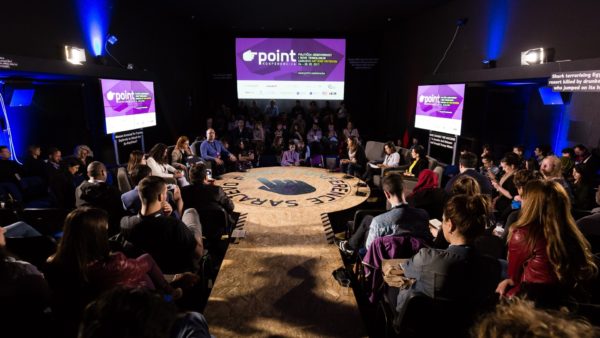The 11th edition of the POINT Conference begins on Thursday
This year’s POINT Conference, the largest event of its kind in the region which will gather numerous activists, journalists, representatives of civil society organizations, but also IT experts from the region and the whole world, will be held from 15-17 June in Sarajevo at the Skenderija Youth Center. As in previous years, conference participants will have the opportunity to discuss numerous topics, such as disinformation in the context of the war in Ukraine and the fight against harmful narratives, feminist tech policy, artificial intelligence and new trends in the regulation of large digital platforms. Moreover, participants will be able to see numerous presentations of innovative initiatives and examples of digital activism from the Western Balkans region.

The eleventh edition of the POINT Conference will begin with a panel discussion on disinformation campaigns about the Russian invasion of Ukraine and will gather speakers from Ukraine, Georgia and the Western Balkans. This panel was organized as part of the project “Western Balkans Anti Disinformation Hub: Exposing malicious influences through watchdog journalism”, which aims to increase public awareness and knowledge about disinformation ecosystems in the Western Balkans. The panel was supported by the Embassy of the Kingdom of the Netherlands.
Mixer, an organization from Poland, also participates in the organization of this year’s POINT, and for the first day of the conference, Mixer prepared a block of topics on new media. At these panels, visitors will be able to learn more about podcasts and the impact of YouTube and video formats on society, media and journalism. Participants will also have the opportunity to listen to the famous war photographer Ron Haviv, who, using the example of photographs of four stories from the wars in the territory of the former Yugoslavia, which did not receive media attention like the recent stories from Ukraine, will talk about how new media change the perspective of war.
The second day of the conference will begin with presentations of regional initiatives and projects. In just over two hours of this session, participants will have the opportunity to learn more about civic participation, election processes, the fight against corruption, and scientific journalism.
This year, there will also be a discussion on new and innovative techniques in the fight against disinformation, which will bring together speakers from France, the USA, Serbia and Bosnia and Herzegovina.
Topics such as fraud on the Internet and profit from the spread of disinformation content will be discussed on the second day of the conference. The discussion will involve Craig Silverman from ProPublica, an investigative journalism organization that won the Pulitzer Prize for its work, Robert Schmid from News Guard, Stefan Janjić from the Serbian initiative Fake News Tragač and Emir Zulejhić, editor of the BiH fact-checking web portal Raskrinkavanje.
The impact of artificial intelligence on all spheres of social life and its rapid development in recent years will be discussed at the conference by Justin-Kasimir Braun from the media company called Lighthouse report, Nancy Yu from Huridocs, Nasir Muftić from the Faculty of Law of the University of Sarajevo, Eeva Moore, representative of the Mozilla Foundation, Kris Shrishak from the Irish Council for Civil Liberties, as well as Antonella Napolitano, a tech policy advisor, who will moderate this discussion.
The official part of the conference will end with a panel discussion on increasingly frequent attacks and harassment in the online and offline world, and this will be discussed with journalists and representatives of fact-checking initiatives from the USA, Great Britain, Croatia and Bosnia and Herzegovina.
On Saturday, June 17, a series of interesting workshops will be held as part of the POINT Conference.
The POINT Conference is organized by UG “Zašto ne” (CA “why not”) in partnership with Mixer and the ACTION SEE, SEE Check and Western Balkans Antidisinformation Hub networks, and is supported by the European Union (EU), the National Endowment for Democracy (NED), the Balkan Trust for Democracy(BTD), DT Institute, the Kingdom of the Netherlands and the Open Society Foundation (OSF).